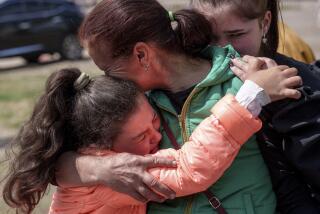Ryzhkov Criticizes New Cabinet System : Soviet Union: The embattled premier, who usually defends Gorbachev, says the leader’s plan ‘will change nothing in the country.’
- Share via
MOSCOW — With the shock of his foreign minister’s resignation still fresh, Soviet President Mikhail S. Gorbachev came under criticism Saturday from yet another member of his inner circle--Nikolai I. Ryzhkov, the embattled prime minister.
Ryzhkov, who usually defends Gorbachev, called the new Cabinet system the president is proposing to increase his control over the government “too cumbersome” and warned that it “will change nothing in the country.”
In a rare attempt to shift some of the blame for the Soviet Union’s deepening crisis away from himself, Ryzhkov complained to reporters at the Congress of People’s Deputies, the national Parliament, that “there have been a lot of mistakes, but why is it that I can say I’m responsible, while others, who walked side by side with me, do not?
“Did we undertake perestroika only to tear our shirts five years later and say that we’re on the edge of an abyss?” he continued. “Gorbachev remains my comrade, but he, too, is responsible for what is happening, just as I am. It must be said honestly what mistakes have been made.”
Liberals have been calling for Ryzhkov’s resignation for months, contending that he has blocked needed economic reforms and proved incompetent in coping with the crisis.
Gorbachev has given Ryzhkov lukewarm support in recent months. Now, he appears to be seeking a dignified way to jettison the prime minister by proposing to do away with the Council of Ministers that Ryzhkov heads and choosing a more compact Cabinet, presumably under a different prime minister.
But the Soviet president appears to be having trouble gathering the parliamentary support to make the needed constitutional amendments, and Ryzhkov supporters now believe that the 61-year-old engineer may not be as politically doomed as many have assumed.
Asked if he would be willing to go on working with Gorbachev in the wake of Foreign Minister Eduard A. Shevardnadze’s dramatic resignation Thursday, Ryzhkov once again appeared to distance himself from the president.
“I’m prepared to work for the country, and not for some specific person,” he said.
Ryzhkov, in a further fragmentation of the Soviet leadership, appeared anxious to set out his own views on the country’s current political and economic crisis. Although dubbed “The Crying Bolshevik” for his emotional reactions to criticism, his comments Saturday were notably hard-edged.
He found fault, for example, with Gorbachev’s handling of people. “Of all those who started the struggle for perestroika in 1985,” he said, “I am the only one who remains at his side now, after Shevardnadze’s resignation.”
Gorbachev’s political nemesis, Russian Federation President Boris N. Yeltsin, got in a glancing blow as well, complaining that rumors of an anti-government conspiracy were spread intentionally--although he did not specify by whom--to further Gorbachev’s push for more power.
“This is an invention aimed at aggravating the situation so as to make strong presidential power a necessity,” Yeltsin told reporters.
Gorbachev has been struggling in recent weeks to fight the country’s economic and political disintegration by assuming more powers and launching a campaign for law and order, which has included the appointment of a tough new interior minister and warnings of a crackdown from the chief of the KGB security police.
On Saturday, he issued a presidential decree that gives authorities in Moldova, the tiny southwestern republic riven by ethnic strife, 10 days to disband nationalist militias and dissolve two self-declared mini-republics whose creation sparked increased violence this fall.
If they fail to obey, the decree warned, “necessary measures will be taken in accordance with the powers granted to the president by the constitution of the Soviet Union.”
Gorbachev has the constitutional power to introduce presidential rule in any area of the Soviet Union, imposing his direct control on local governments, and he can also declare a state of emergency and deploy troops to enforce it.
Leaders of the three Baltic republics, Estonia, Latvia and Lithuania, say they are deeply afraid of a Kremlin crackdown in the near future, largely as a result of their open hostility toward the Soviet military units on their territory.
Tension is especially high in Lithuania, where the army garrison in the port city of Klaipeda announced that it will begin patrolling the streets and checking civilians’ documents, and in Latvia, where more than five bomb blasts in the past two weeks have frightened the population, although no one was injured. An explosion early Saturday blew out 200 windows at a military school in the Latvian capital of Riga, the official news agency Tass reported.
More to Read
Sign up for Essential California
The most important California stories and recommendations in your inbox every morning.
You may occasionally receive promotional content from the Los Angeles Times.













